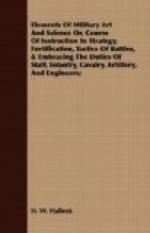“Prince Eugene was singularly gifted with these qualifications, particularly with that sublime possession of the mind, which constitutes the essence of a military character.”
“Many commanders-in-chief have been so limited in their ideas of warfare, that when events have brought the contest to issue, and two rival armies have been drawn out for action, their whole attention has devolved upon a straight alignment, an equality of step, or a regular distance in intervals of columns. They have considered it sufficient to give answers to questions proposed by their aides-de-camp, to send orders in various directions, and to gallop themselves from one quarter to another, without steadily adhering to the fluctuations of the day, or calmly watching for an opportunity to strike a decisive blow. They endeavor, in fact, to do every thing, and thereby do nothing. They appear like men whose presence of mind deserts them the instant they are taken out of the beaten track, or reduced to supply unexpected calls by uncommon exertions; and from whence, continues the same sensible writer, do these contradictions arise? from an ignorance of those high qualifications without which the mere routine of duty, methodical arrangement, and studied discipline must fall to the ground, and defeat themselves. Many officers spend their whole lives in putting a few regiments through a regular set of manoeuvres; and having done so, they vainly imagine that all the science of a real military man consists in that acquirement. When, in process of time, the command of a large army falls to their lot, they are manifestly lost in the magnitude of the undertaking, and, from not knowing how to act as they ought, they remain satisfied with doing what they have partially learned.”
“Military knowledge, as far as it regards a general or commander-in-chief, may be divided into two parts, one comprehending mere discipline and settled systems for putting a certain number of rules into practice; and the other originating a sublimity of conception that method may assist, but cannot give.”




